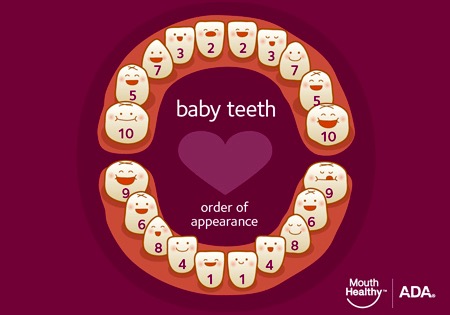
From prenatal to the early years of development, make sure your child is getting the dental care they need.
Prenatal dental care
Babies don’t even start to teethe until they are 4 to 7 months old, but childhood dental health can be influenced by mothers during pregnancy. There are two things pregnant women can do to help their babies develop strong bones and teeth:
Take care of your own teeth and gums
Hormonal changes and morning sickness both make pregnant women more vulnerable to gum infections. The acid produced from vomiting can also weaken the protective enamel on teeth, so pregnant women should wait until 20 minutes after they’ve last vomited to brush their teeth. Flossing every day, brushing twice daily and making regular visits to the dentist all support dental health during pregnancy. The more established a mother’s dental habits are, the easier it will be to teach children those habits by example.
Monitor calcium and vitamin D intake
Vitamin D and calcium work together to support the development of strong bones and teeth. Most dietary calcium comes from milk and dairy products or calcium-rich leafy greens like kale or from wild salmon. Our bodies create vitamin D when our skin is exposed to the rays of the sun. The problem is that Canadians spend about 90% of their time indoors, we wear sun screen and have long dark winters. If you are pregnant, or thinking of becoming pregnant, talk to your doctor about taking vitamin D and calcium supplements during pregnancy.
Oral Health Tips for Babies from the College of Dental Hygienists of Ontario
Oral Health Matters for You and Your Baby from the College of Dental Hygienists of Ontario
Birth to teething stage
Long before your baby’s teeth begin to come in, you can begin to care for their gums and stop the harmful bacteria that cause early childhood tooth decay from growing in their mouths.
· Twice a day, gently wipe your baby’s gums with a clean wash cloth.
· Try not to put baby to bed with a bottle! Water is safe, but formula, juice and other liquids pool in the baby’s mouth while he or she sleeps. The bacteria that cause tooth decay can then grow.
Teething
When Will My Baby's Teeth Come In?

Most babies begin teething between the ages of 4 and 7 months. Keep a teething ring in the fridge so that he or she can self soothe with the cold toy. Most teething babies will want to nurse more often and gently rubbing the gums with a clean cloth after nursing is still comforting too. Once the first tooth appears, it’s time to introduce the first toothbrush!
First tooth to age 3
How to Avoid Baby Bottle Tooth Decay
Brush your child’s teeth twice a day using a portion of toothpaste that is the size of a grain of rice. The sooner children stop using bottles and start using cups, the better it will be for their teeth! Liquids have less contact with the teeth as they are sipped than they do when they are sucked over the back teeth. Try to avoid sweet drinks like pop and juice as much as possible. Offer a thirsty child water between meals. Every month, check behind your children’s lips to ensure that nothing unusual is present. Make a dental appointment any time before age 3. Take your toddler and another caregiver with you when you have a dental appointment. Seeing you open your mouth to have your teeth looked at will make a visit to the dentist normal and routine. If they start to fuss, the caregiver can take over.
Ages 3 to 6
Continue to make brushing your teeth a twice daily event in your family. Hum a simple song like “Happy Birthday” or “Twinkle Twinkle” as you brush together to make sure brushing lasts long enough and reaches the front and back of each and every tooth. Good habits established during the “baby teeth” phase are the best protection for adult teeth.
